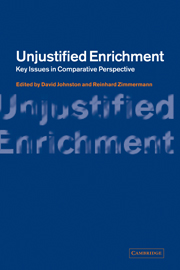Book contents
- Frontmatter
- Contents
- List of contributors
- Preface
- Table of cases
- List of abbreviations
- I Introduction
- II Enrichment ‘without legal ground’ or unjust factor approach
- III Failure of consideration
- IV Duress and fraud
- V Change of position
- VI Illegality
- 10 The role of illegality in the English law of unjust enrichment
- 11 Illegality as defence against unjust enrichment claims
- VII Encroachment and restitution for wrongs
- VIII Improvements
- IX Discharge of another person's debt
- X Third-party enrichment
- XI Proprietary issues
- XII Taxonomy
- Index
11 - Illegality as defence against unjust enrichment claims
Published online by Cambridge University Press: 31 July 2009
- Frontmatter
- Contents
- List of contributors
- Preface
- Table of cases
- List of abbreviations
- I Introduction
- II Enrichment ‘without legal ground’ or unjust factor approach
- III Failure of consideration
- IV Duress and fraud
- V Change of position
- VI Illegality
- 10 The role of illegality in the English law of unjust enrichment
- 11 Illegality as defence against unjust enrichment claims
- VII Encroachment and restitution for wrongs
- VIII Improvements
- IX Discharge of another person's debt
- X Third-party enrichment
- XI Proprietary issues
- XII Taxonomy
- Index
Summary
As a defence, illegality implies that the plaintiff's own illegal or immoral conduct can defeat a claim in unjust enrichment which would otherwise lie. Whether or not illegality can also serve as a ground for restitution is a different question, which is treated elsewhere in this book. The present article will concentrate on situations where both parties are responsible for the illegality, as one-sided illegality will frequently not render a contract void, with the result that no action will lie in the first place because the enrichment was supported by a causa (in civil-law terminology) or by consideration (in the language of the common law).
There is, interestingly, no divide between common law and civil law as regards the illegality defence. This has largely to do with the fact that this defence can be traced back to Roman law in all legal systems under consideration.
Illegality and other unjust enrichment defences
It could be argued that, next to change of position, illegality is the only other defence which is specific to unjust enrichment claims and which does not depend on how grounds of restitution are structured. In many other cases, one system's ground of restitution, put in the negative, is the other's defence against such a claim. Three examples should suffice:
If one party intentionally enriches another party, mistake will be a ground of restitution in the common law. Most civilian systems will grant restitution if the enrichment is not supported by a legal cause. But lack of mistake concerning such a causa will then operate as a defence, as, for example, in §814 of the German Civil Code (Bürgerliches Gesetzbuch, BGB).
[…]
- Type
- Chapter
- Information
- Unjustified EnrichmentKey Issues in Comparative Perspective, pp. 310 - 324Publisher: Cambridge University PressPrint publication year: 2002
- 1
- Cited by



